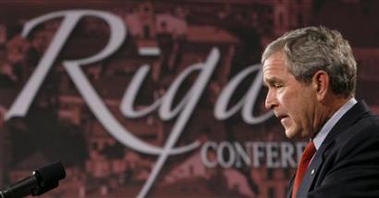NATO determined to succeed in Afghanistan
(Reuters)Updated: 2006-11-29 10:00
RIGA - NATO leaders will declare their determination on Wednesday to prevail over Taliban insurgents in Afghanistan while offering only small increases in troop levels and flexibility.
A NATO spokesman said three countries had pledged more troops and that a majority had agreed to ease restrictions on where and how their forces could fight in Afghanistan.
He declined to name the countries, but said they were in addition to Canada, Denmark and the Czech Republic, which have already made public pledges to increase troop levels.
"A number of nations said they will look to increase, in some cases substantially, their financial commitments to the civilian efforts in Afghanistan -- development assistance, reconstruction," he added.
Still, several major nations made it clear they had not completely lifted restrictions.
France, Germany, Italy and Spain, who sparked a row by refusing calls in September to send troops to the Taliban's southern Afghan heartland, promised to send help to trouble zones outside their patches in emergencies, officials said.
Italian Prime Minister Romano Prodi said Italy's position on troop locations and numbers had not changed and it would only move forces "in extremis."
"Tonight other countries such as Germany, France and Spain expressed the same position as ours," he said.
French officials said France could "on a case-by-case basis and on request" send troops outside their zone if necessary.
Madrid's pledge was yet more guarded, with a Spanish official saying Prime Minister Jose Luis Rodriguez Zapatero had offered use of Spanish helicopters in exceptional circumstances to help evacuate wounded NATO solders, and not for combat.
France has a contingent in the capital Kabul and Spanish troops operate in the relatively calm west.
The most urgent need is in southern Afghanistan, where British, Dutch and Canadians have suffered heavy casualties.
A Canadian official said Canada had pledged 1,000 more troops without geographical or other restrictions.
The official said Canada, which has lost 44 soldiers in the conflict including two this week, would like to see all countries in Afghanistan drop such "bureaucratic restrictions."
"Afghanistan is not a priority but the priority for NATO," the official said.
Before the summit began, President George W. Bush said success in Afghanistan can only come if member countries accept "difficult assignments."
NEW HORIZONS
On Wednesday, leaders will attend a two-hour working session and will then release a communiquetting out their NATO goals.
While Afghanistan dominated on Tuesday, Wednesday's talks were likely to be more wide-ranging, touching on issues such as NATO enlargement, energy security, political guidelines for the military and modernizing military capabilities.
NATO expects to issue more invitations to candidate countries to join at its next summit in 2008.
The communiquîhill differentiate subtly among the three current aspirants in NATO's Membership Action Plan, Croatia, seen as best prepared, Macedonia and Albania.
Diplomats said there was a chance NATO might after all invite Bosnia, Serbia and Montenegro to take the first step toward membership by joining the Partnership for Peace.
NATO had been reluctant because Serbia and Bosnia are not fully cooperating with the UN war crimes tribunal in arresting and handing over top former Bosnian Serb leaders, Radovan Karadzic and Ratko Mladic.
But the diplomats said the United States had had a late change of heart, apparently swayed by a letter from reformist Serbian President Boris Tadic appealing to NATO to help the democrats in his country.
"We are not there yet, but it looks like all three could make it," one senior NATO diplomat said.
|
||
|
||
|
|

